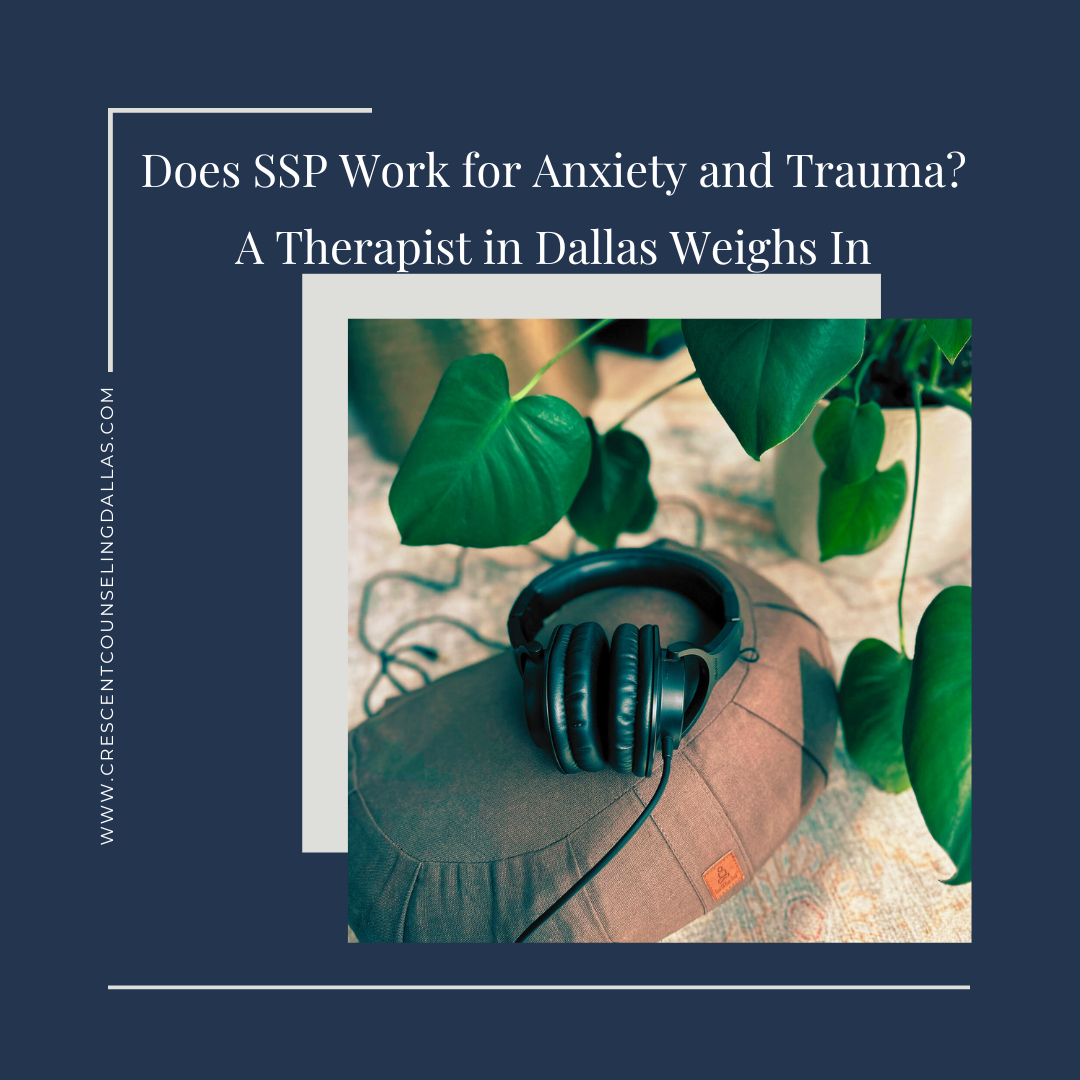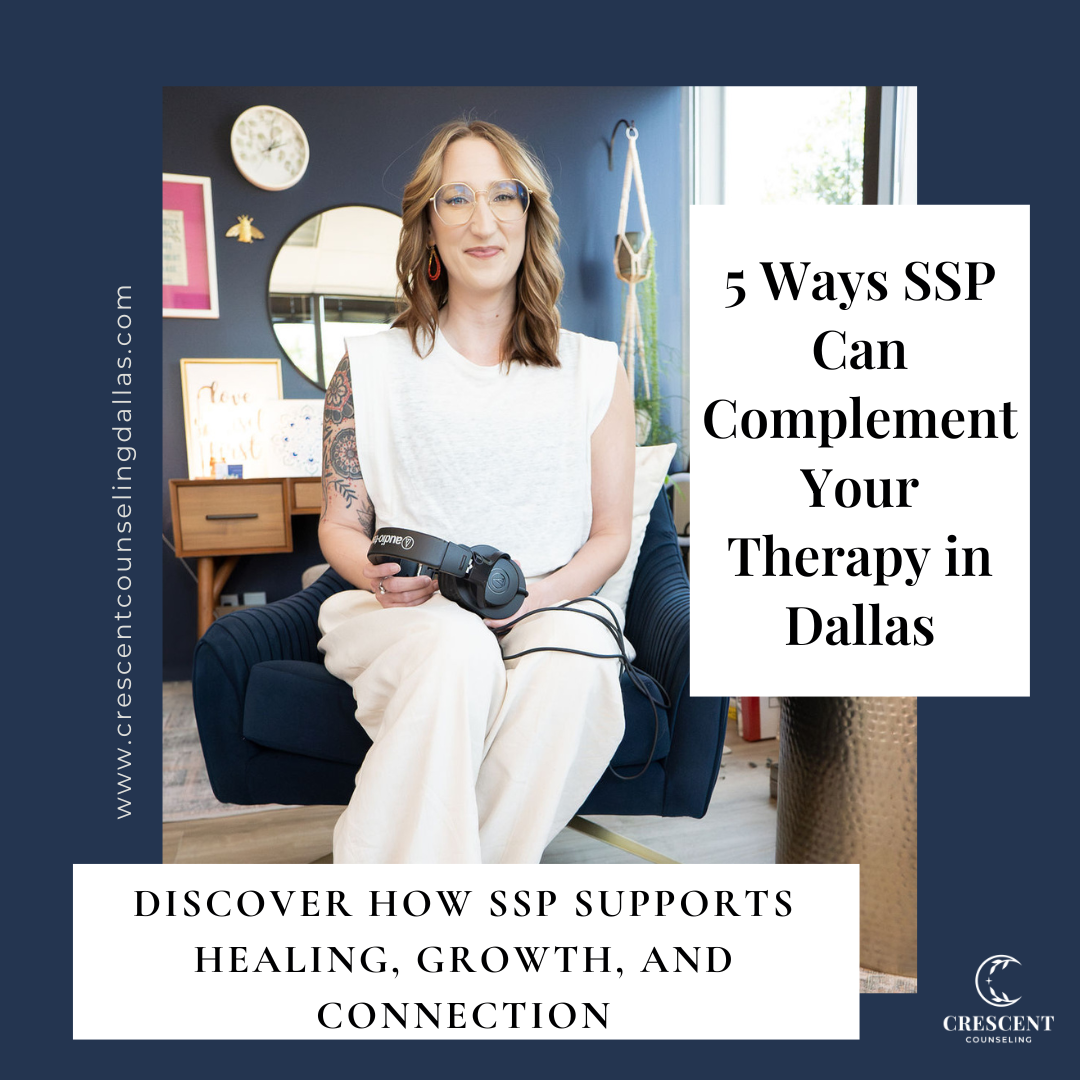
Trauma Therapy in Dallas, TX
Searching for healing from trauma in Dallas, TX and…
You’ve had exposure to traumatic events that have left deep scars that seem to affect every aspect of life. You're feeling the weight of trauma and are seeking a path to healing. You find yourself grappling with intense emotional responses, feeling disconnected from your body, or struggling to form healthy relationships. Sometimes you wonder if these challenges are just 'in your head.'
You’re ready for a life where trauma doesn’t define your existence. A life where you can thrive, not just survive. You’re ready to learn to cultivate self-compassion, establish healthy boundaries, and rediscover joy and meaning in your life.
My name is Amanda. I’m a trauma-informed therapist in Dallas and I can help
I’m passionate about helping you find healing from trauma, acute, chronic, or complex.

I understand the turbulent waters of trauma and the deep and often hidden struggles that come with this journey. Trauma therapy with me is more than just a service; it's a sanctuary where healing and understanding begin. The challenges you’re experiencing are real, valid, and deeply impactful.
I specialize in trauma therapy that addresses the unique needs of those with trauma, especially those with Complex PTSD. My approach is grounded in empathy, understanding, and the latest in trauma-informed care. My mission is to guide you towards a life where trauma does not define your existence. A life where you can thrive, not just survive.
In therapy with me, here’s some of what you can expect:
Interpersonal Neurobiology (IPNB) Framework: My therapy sessions are guided by the principles of IPNB, which help in understanding how your brain and relationships shape your experiences and responses to trauma.
Polyvagal Theory: I incorporate insights from Polyvagal Theory to help you understand and regulate your body's response to stress and trauma, fostering a sense of safety and agency.
Brainspotting and Safe and Sound Protocol: As a therapist trained in Brainspotting and certified in the Safe and Sound Protocol, I offer innovative methods that can help unlock and process deep-seated traumatic memories and emotions while helping you move toward regulation and safety.
Sensorimotor Psychotherapy: Sensorimotor Psychotherapy allows me to integrate somatic therapy techniques, attachment theory, cognitive applications, neuroscience, and techniques from the Hakomi mehtod to help reconnect you with your body, often disassociated due to trauma. This approach fosters a deeper healing process, allowing you to experience emotions and sensations in a safe and therapeutic environment.
Ego State Therapy: I Integrate ego state therapies into my practice, offering a comprehensive approach to healing from trauma. By acknowledging and working with the various 'parts' of your psyche, I aim to help you foster a deeper, more compassionate understanding of yourself, leading to profound and lasting change.
Individualized Care and Support: Every journey through trauma is unique. With me, your therapy is tailored to meet your individual needs, helping you build resilience and regain a sense of self.
“Any experience of fear and/or pain that doesn’t have the support it needs to be digested and integrated into the flow of our developing brains.”
— Bonnie Badendoch in The Heart Of Trauma
In providing trauma therapy, I ascribe to this definition provided by Bonnie Badendoch in The Heart Of Trauma. I am honored to be a part of your journey of trauma healing and recovery.

Connect with me for your trauma therapy consultation
Maybe you’re wondering “does trauma therapy work?” or “what happens in trauma therapy?” I invite you to connect with me. Schedule your free phone consultation for trauma therapy in Dallas, and let's start your journey towards recovery together.
Your story deserves to be heard, and your healing journey, a chance to begin. Connect with me here and I’ll reach out to schedule your free phone consultation for trauma therapy in Dallas. I’ll spend 15-minutes on the phone with you to start learning about you and to share about what I do with you as a trauma-informed therapist. I’d love to answer your questions and to help you start your journey towards healing. My specialties also include
Have questions about therapy in Dallas, TX? That’s normal! Learn about me, or check out our FAQs about therapy.
FAQs
-
Being a trauma therapist means I’ve dedicated my practice to understanding and treating the impacts of trauma in a deep, holistic way. I’ve intentionally focused my continuing education on trauma-informed approaches, ensuring I can offer effective tools and techniques to help clients on their healing journey.
Some of the training and certifications I’ve completed include:
Certified in Brainspotting, a powerful brain-body-based modality for processing trauma.
Completed Level 1 of Sensorimotor Psychotherapy, with plans to continue advancing in this transformative somatic approach.
Certified in the Safe and Sound Protocol (SSP), an evidence-based listening therapy for nervous system regulation.
Active member of the International Society for the Study of Trauma and Dissociation (ISSTD), currently pursuing an Advanced Certificate in Complex Trauma and Dissociation.
Completed Healing Trauma: IPNB Clinical Strategies for Applying the 9 Domains of Integration toward Deep Therapeutic Growth through Dan Siegel's Mindsight Institute.
I also regularly engage in individual consultation with other professionals in these fields, collaborate with colleagues to practice and refine skills, and stay up to date with the latest research and techniques.
Many of these modalities are best learned by experiencing them myself, so I’ve taken the time to explore and embody these approaches in my own work. This commitment allows me to not only better understand what my clients might experience but also create a safe, informed, and compassionate space for healing.
-
What is trauma-focused therapy?
Trauma-focused therapy is a collaborative process designed to help you heal from the effects of trauma in a way that feels safe, supportive, and empowering. In my approach, I follow a three-phase roadmap for change:
Establishing Safety and Stability
The first step in trauma therapy is helping you feel grounded and secure. This includes creating a safe space for our work together and developing tools to regulate your nervous system. We'll focus on building resources to support you through the process, so you feel empowered and in control.Processing Trauma
When you're ready, we’ll begin exploring the effects of trauma at a pace that feels manageable. My focus is not solely on the details of your story but on how trauma has impacted your body, mind, and emotions. Somatic work is a key part of this process, helping us work with what’s happening in your body and nervous system to release what’s been stuck or overwhelming.Integration and Growth
The final phase focuses on creating lasting change by integrating the progress we've made. This involves fostering resilience, strengthening your sense of self, and supporting you as you move forward with greater ease and confidence in your life and relationships.
Trauma-focused therapy emphasizes process over content, meaning you don’t have to relive every detail of your story for healing to happen. While hearing and holding your story is important to me, my approach centers on helping you listen to what your body and emotions are telling you, gently working with what arises, and moving toward a sense of wholeness.
This type of therapy isn’t about rushing—it’s about honoring where you are and helping you reconnect with a deeper sense of safety, strength, and self-compassion.
-
Trauma therapy can feel challenging because it asks us to confront parts of ourselves that have been overwhelmed, shut down, or even hidden away for a long time. Trauma affects not just our thoughts but also our bodies, emotions, and sense of safety. When we start to untangle those threads, it’s normal to feel a mix of vulnerability, discomfort, and even resistance.
It’s hard because trauma doesn’t just live in our memories—it’s stored in the body and nervous system. That’s why things like certain sounds, smells, or even feelings can trigger a response that doesn’t seem to match the present situation. In therapy, we work to gently explore these responses, which can stir up emotions or sensations you’ve been avoiding to protect yourself. That’s tough work! But it’s also where healing happens.
Another reason trauma therapy feels hard is that it requires patience and self-compassion. Trauma is a slow process to unwind because it’s deeply woven into how we think, feel, and interact with the world. It can feel frustrating to take small steps instead of diving straight into the “fix.” But those small steps build the foundation for real, lasting change.
What makes trauma therapy possible—and worth it—is that you’re not doing it alone. My role is to guide and support you through the process, ensuring that we move at a pace that feels safe and manageable for you. Along the way, we’ll celebrate every bit of progress and build the resources you need to feel resilient and empowered, even when the work feels hard.
Healing from trauma takes courage, but that courage grows as you start to feel the benefits: greater connection to yourself and others, more capacity to regulate your emotions, and a deeper sense of peace. And while it’s hard, it’s also one of the most rewarding journeys you can take.
-
Trauma therapy offers more than just relief from painful memories—it helps you build a life that feels safe, connected, and fulfilling. When trauma impacts your nervous system, emotions, and relationships, it can leave you feeling stuck, overwhelmed, or disconnected from yourself and others. Trauma therapy provides a space to process these experiences while equipping you with tools to regain a sense of control, resilience, and self-compassion.
In trauma therapy, you'll learn how to calm your nervous system and recognize the patterns your body and mind have developed to cope with the trauma. These patterns might look like fight-or-flight responses, shutting down emotionally, or feeling stuck in intrusive memories. Through somatic work, mindfulness, and relational exploration, we gently help your body and mind reconnect, creating space for healing and growth.
The benefits of trauma therapy include:
Improved emotional regulation: Learn to manage overwhelming emotions like anxiety, anger, or sadness without feeling consumed by them.
Deeper self-awareness: Build a stronger connection with your body and emotions, allowing you to understand your triggers and patterns with curiosity instead of judgment.
Healthier relationships: Develop the capacity to set boundaries, communicate effectively, and connect with others in a way that feels authentic and safe.
A greater sense of safety and control: Feel more grounded and present in your daily life, even in situations that used to feel overwhelming or triggering.
Trauma therapy isn’t about erasing your past—it’s about integrating those experiences in a way that allows you to move forward with confidence and wholeness. Whether you're struggling with complex trauma, PTSD, or the lasting effects of a challenging experience, therapy can be a powerful step toward reclaiming your life.
If you're curious about how trauma therapy might help you, reach out through my Contact page to schedule a consultation. Together, we’ll explore how I can support you in your healing journey.









